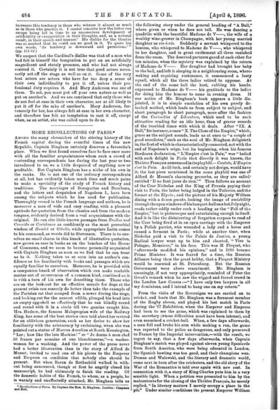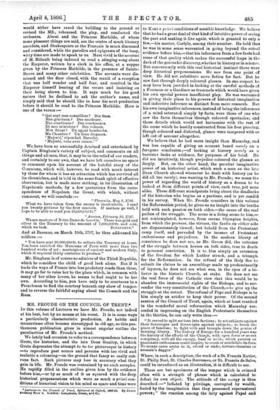MORE RECOLLECTIONS OF PARIS.*
Astoria the many chroniclers of the stirring history of the French capital during the eventful times of the new Republic, Captain Bingham certainly deserves a favourite's place. When we first found ourselves face to face once more with all the familiar acquaintances whom such a crowd of contending correspondents has during the last year or two introduced to us, we a little despaired of anything new or profitable. But Captain Bingham has a niche of his own in the ranks. He is not one of the ordinary correspondents at all, but has evidently taken much time and much pains to make a speciality of the study of French history and traditions. The marriages of Bonapartes and Bourbons, and the letters and despatches of Napoleon I., have been among the subjects which he has used for publication. Thoroughly versed in the French language and authors, he is moreover a man of wide and easy reading, with a pleasant aptitude for quotation from the classics and from the modern tongues, evidently derived from a real acquaintance with the original. He can cite little-known passages from Troilus and Cressida or Coriolanus as confidently as the most proverbial wisdom of Hamlet or Othello, while appropriate Latin comes to his command, as words did to Stevenson. There is to our- selves no small charm in this knack of illustrative quotation, now grown as rare in books as on the benches of the House of Commons, and we seem to become personally acquainted with Captain Bingham as soon as we find that he can treat us to it. Nothing takes us so soon into an author's con- fidence as his familiarity with books and passages which are equally familiar to ourselves. Moreover, he is provided with a companion knack of observation which can make readable matter out of ocaurrencea of a common kind, combined as it is with a turn of Lie own for describing them. Those who are on the look-out for an effective muzzle for dogs at the present crisis can scarcely do better than take the example of the Parisian rat that escaped from a sewer during the siege, and looking out for the nearest edible, plunged his head into an empty egg-shell so effectively that he ran blindly round and round with it in a circle till two gamins caught him. Mrs. Hudson, the famous Malapropian wife of the Railway King, has some of the beat stories once told about her revived for an oblivious generation, such as her desire to show her familiarity with the aristocracy by exclaiming, when she was pointed outs statue of Marcus Aurelius at South Kensington, " Lor ; how like the late Mark iss ! " or " Je donne ii mon chef 50 francs par semaine et une blanchisseuse,"—a washer- woman for a washing. And the power of the purse never had a better illustration than in the story of Alfred de Mussel, invited to read one of his pieces to the Emperor and Empress on condition that nobody else should be present. But when Baron de Rothschild walked in with- out being announced, though at first he angrily closed his manuscript, he bad ultimately to finish the reading. Of the domestic habits of the French, to whom, as a people, he is warmly and unaffectedly attached, Mr. Bingham tells us • limellmtiona of ?aril. By Captain the Bon. D. Bingham, London: Chapman sad Ball. the following story under the general heading of "A Ball," where given or when he does not tell. He was dancing a quadrille with the beautiful Madame de V—, the wife of a wealthy wine-grower in Champagne, with her young married daughter as cis-d-rois. Suddenly a servant whispered to the hostess, who whispered to Madame de V—, who whispered to her daughter, and in great excitement all three vanished from the room. The deserted partners gazed at each other for ten minutes, when the mystery was explained by the return of Madame de V—. Her daughter had brought her baby to the ball, and left it sleeping in a neighbouring room, where, waking and requiring sustenance, it commenced a lusty squall, which all the three ladies retired to appease. At the end of the same ball the host, rubbing his hands, expressed to Madame de V— his gratitude to the ladies for doing him the honour to come in evening dress. If our notice of Mr. Bingham's book appears a little dis- jointed, it is in simple emulation of his own purely de- tached method, which leads us from subject to subject, and short paragraph to short paragraph, more after the fashion of the Curiosities of Literature, which used to be suck attractive reading for an idle hour, than of graver records of the troubled times with which it deals. After "IX. A Ball," for instance, comes " X. The Close of the Empire," which,. grave as the subject sounds, leads us at once to " a couple of good anecdotes," such as the soul of Mr. Bingham delighteth in, the first of which is characteristically connected, not with the end of Napoleon's reign, but its beginning, when his famous Bordeaux declaration, " L'Empire c'est la Pair," was " hailed with such delight in Paris that directly it was known, the Theatre Francais announced in its playbill,— Cant ate, L'Empire c'est la Paix. As ill-luck, and certainly not design, would have it, the last piece mentioned in the same playbill was one of Alfred de Musset's charming proverbs, as they are called' entitled ' Il ne faut jurer de rien." Then follows an account of the Czar Nicholas and the King of Prussia paying their visit to Paris, the latter being lodged in the Tuileries, and the former at the Elysee; and the picture of his Majesty William dining with a dozen guests, looking the image of amiability through the open windo ws of his banquet-ball on a hot Ju ly n igh t, reads rather oddly under such a heading as the "Fall of the- Empire," but is picturesque and entertaining enough in itself. And it is like the disinterring of forgotten corpses to read of the Czar being fired at in an open carriage with the Emperor by a Polish patriot, who wounded a lady and a horse and caused a ferment in Paris ; while at another time, when Nicholas paid a visit to the Palais de Justice, a young Radical lawyer went up to him and shouted, " Vive la Pologne, Monsieur," in his face. This was M. Floquet, who afterwards modified his opinions," and in 1S88 became Prime Minister. It was feared for a time, the Russian Alliance being then the great hobby, that a Floquet Ministry would be resented at St. Petersburg. But the Russian Government were above resentment. Mr. Bingham is amusingly, if not very appropriately, reminded of Peter the Great's remark when he saw the wigged and furred crowd in the London Law Courts :—" I have only two lawyers in all my dominions, and I intend to hang one on my return."
From the visits of the Sovereigns we are carried on to cricket, and learn that Mr. Bingham was a foremost member of the Rugby eleven, and played his last match in Paris during the '67 Exhibition, when the Emperor and Empress bad been to see the game, which was explained to them by the secretary (whose difficulties must have been. intense), and even examined a cricket-ball. When, a few days• afterwards, a man fell and broke his arm while making a run, the game- was reported to the police as dangerous, and only preserved to France by the Imperial intervention,---with the result, we regret to say, that a few days afterwards, when Captain Bingham's match was played against eleven young Spaniards from South America, who were being educated in London, the Spanish bowling was too good,. and their champions won. Dumas and Walewski, and the literary and dramatic world, come next in turn after the cricketers, and the old story of the War of the Romantics is told over again with new zest. In connection with it, a story of King Charles puts him in a very sensible light. When a petition was presented to him by the malcontents for the closing of the Theiltre Francais, he merely replied, " In literary matters I merely occupy a place in the pit." Under similar conditions the present Emperor William would either have razed the building to the ground or revised the MS., rehearsed the play, and conducted the orchestra. About and the Princess Mathilde, of whom some pleasant things are said, are the centre of much literary anecdote, and Shakespeare at the Francais is much discussed and considered, while the parodies and epigrams of the busy, witty time are made to speak to us. Most vivid is the account of M. Billault being induced to read a stinging song about the Emperor, written by a clerk in his office, at a supper given by the Princess Mathilde, in the presence of Sainte- Beuve and many other celebrities. The servants were dis- missed and the door closed, with the result of a reception that was half wonder and half fear, and resulted in the Emperor himself hearing of the verses and insisting on their being shown to him. It says much for his good nature that he declined to ask the author's name, and simply said that he should like to hear his next production before it should be read to the Princess Mathilde. Here is one of the verses :-
" Qui sont mes conseillers ? Des tines. Net g6neraux ? Des racoleurs. Mes courtisans ? Des courtisanes. Et mes ministres ? Des voleurs. Mon Senat ? Un appui bamboche. Ma Chambre ? Un faux diapason.
• Majestii,' repondait Parodic, Majeste, vous avez raison.' "
We have been so successfully detained and entertained by Captain Bingbam's variety of subject, and comments on all things and all men, that, it may be to the relief of our readers, and certainly to our own, that we have left ourselves no space to comment upon hie account of the hateful story of the Commune, which will, however, be read with much interest by those for whom it has an attraction which has survived all its chroniclers, and is told in the same frank spirit of effective observation, but is made more striking, in its illustration of Napoleonic methods, by a few quotations from the corre- spondence of Napoleon the Great, with which, without comment, we will conclude :—
"Placentia, May 9, 1796.
What we have taken from the enemy is incalculable. I send you twenty pictures by the first masters. If matters go well, I hope to be able to send you 10,000,000 fr."
"Ancona, February 10, 1797.
We are masters of Notre Dame de Lorette. There was gold and silver in the Treasury to the amount of 7,000,000 fr. and coin,
which we took. BONAPARTE."
And at Bassano, on March 10th, 1797, he thus addressed his soldiers :—
" You have sent 30 000,000 fr. to relieve the Treasury at home. You have enriched the Museums of Paris with more than two hundred works of act : masterpieces of ancient and modern Italy, which it required thirty centuries to produce!'
Mr. Bingham is of course no admirer of the Third Republic, which he considers the child of good luck alone. But if it leads the ways of France into less predatory roads than these, it may go far to raise her to the place which, in common with many of her other lovers, he seems to feel ought to be her own. According to him, you have only to be courteous to a Frenchman to find the courtesy beneath any show of temper.
and to reverse the faithful saying about the Cossack and the Russ.



































 Previous page
Previous page